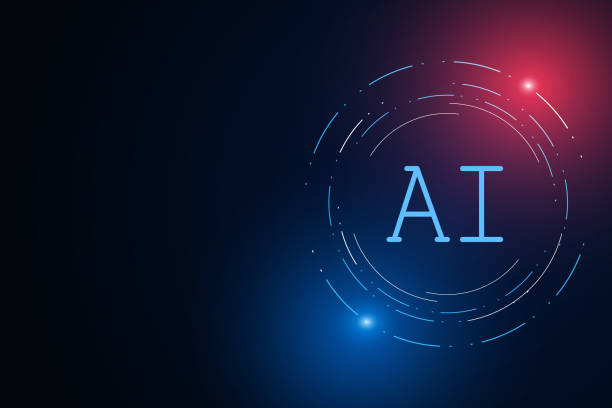### What is Artificial Intelligence and What are its Applications?
[Image of a futuristic round banner with a computer circuit and artificial intelligence]
#Artificial Intelligence (AI), in short, refers to the ability of a computer system to imitate human cognitive functions such as learning, problem-solving, and decision-making.
Artificial intelligence is not just a technology, but a broad field that includes various disciplines of computer science, mathematics, statistics, and even neuroscience.
The applications of artificial intelligence are very wide and diverse and have penetrated almost all aspects of modern life.
From [smart systems](https://fa.wikipedia.org/wiki/%D8%B3%D8%A7%D9%85%D8%A7%D9%86%D9%87_%D9%87%D9%88%D8%B4%D9%85%D9%86%D8%AF) in mobile phones and self-driving cars to medical diagnosis and financial market forecasting, artificial intelligence plays an important role.
This technology helps organizations and businesses increase their efficiency, automate processes, make better decisions, and offer more innovative products and services.
In short, artificial intelligence is a powerful tool that can help us solve complex challenges and improve the quality of life.
The correct and responsible use of this technology can create a brighter and more advanced future for everyone.
>How much does losing business leads due to an unprofessional website cost you? Solve this problem forever with a professional corporate website design by Rasaweb!
>✅ Increase the credibility and trust of potential customers
>✅ Attract new business leads more easily
>⚡ Get a free consultation right now!
Types of Artificial Intelligence: Approaches and Differences
[Image of a CRM pictogram in a robot hand – customer relationship management]
Artificial intelligence can be categorized based on various criteria.
One of the most common methods is classification based on capabilities and abilities.
In this classification, artificial intelligence is divided into two general types: Narrow AI and General AI.
Narrow AI, also known as weak AI, is designed to perform a specific task and performs well in that area.
For example, a facial recognition system or a computer chess game are examples of Narrow AI.
In contrast, General AI, also known as strong AI, has the ability to understand, learn, and do anything that a human can do.
This type of artificial intelligence is still under development and has not been fully realized.
Click here to preview your posts with PRO themes ››
Different approaches also exist for developing artificial intelligence.
The two main approaches are [Machine Learning](https://virgool.io/@sajjadghanbari/19881103) and Expert Systems.
Machine learning allows systems to learn from data and improve their performance, while expert systems rely on the specialized knowledge of humans and use rules and logic to solve problems.
Machine Learning and its Role in the Development of Artificial Intelligence
[Image of concepts development of artificial intelligence and self-learning]
Machine Learning is one of the most important branches of artificial intelligence that allows systems to learn from data and identify patterns without explicit programming.
In other words, instead of instructing systems on how to perform a task, they are given data to find the solution themselves.
Machine learning plays a vital role in the development of many artificial intelligence applications, including image recognition, natural language processing, and recommender systems.
There are different types of machine learning algorithms, including supervised learning, unsupervised learning, and reinforcement learning.
Each of these algorithms is suitable for a particular type of problem and has its own advantages and disadvantages.
Machine learning has enabled artificial intelligence to automatically learn from data and improve its performance, which has made it possible to develop more complex and efficient intelligent systems.
| Type of Machine Learning Algorithm | Description | Applications |
|---|---|---|
| Supervised Learning | Training with labeled data | Image recognition, text classification |
| Unsupervised Learning | Identifying patterns in unlabeled data | Clustering, dimensionality reduction |
| Reinforcement Learning | Learning through trial and error and receiving rewards | Games, robotics |
Challenges and Limitations of Artificial Intelligence
[Image of a futuristic round banner with a computer circuit and artificial intelligence]
Despite its remarkable advances, artificial intelligence still faces numerous challenges and limitations.
One of the most important challenges is the need for large and high-quality data to train machine learning models.
Without sufficient and appropriate data, the performance of these models is severely reduced.
Another challenge is the issue of bias in data and algorithms.
If the training data contains biases, artificial intelligence models will also learn these biases and apply them in their decision-making.
This can lead to discrimination and inequality.
Also, Interpretability of artificial intelligence models, especially deep neural networks, is another important challenge.
In many cases, it is difficult to understand why an artificial intelligence model has made a particular decision.
This can reduce trust in these systems and limit their use in sensitive areas.
Ethical and legal issues are also among the challenges facing artificial intelligence.
The use of artificial intelligence can have serious implications for privacy, job security, and human rights and requires careful consideration and the development of appropriate laws and regulations.
>Don’t have a corporate website yet and are missing out on online opportunities? With a professional corporate website design by Rasaweb,
>
>✅ Double your business credibility
>
>✅ Attract new customers
>
>⚡ Free consultation for your corporate website!
What will the future of Artificial Intelligence be?
[Image of a hand holding an artificial intelligence brain hologram]
The future of artificial intelligence is bright and full of potential.
It is expected that this technology will increasingly penetrate our lives in the coming years and create profound changes in various industries.
Further advances in machine learning, especially deep learning, will enable the development of more complex and efficient intelligent systems.
Artificial intelligence in [fields](https://www.isna.ir/news/1402111106609/%DA%A9%D8%A7%D8%B1%D8%A8%D8%B1%D8%AF%D9%87%D8%A7%DB%8C-%D9%87%D9%88%D8%B4-%D9%85%D8%B5%D9%86%D9%88%D8%B9%DB%8C-%D8%AF%D8%B1-%D8%B2%D9%86%D8%AF%DA%AF%DB%8C-%D9%85%D8%B3%D8%AA%DB%8C-%D8%AF%D8%B1-%D8%B3%D8%A7%D9%84-2024) such as healthcare, education, transportation, and manufacturing will play a more important role and help improve the quality of life and increase productivity.
Also, it is expected that Artificial General Intelligence (AGI) will become a reality in the not-too-distant future.
AGI can have the ability to understand, learn, and do anything that a human can do and will have profound implications for society and the economy.
However, the development of AGI requires solving many technical and ethical challenges and requires careful consideration and the development of appropriate strategies.
The impact of Artificial Intelligence on the labor market
[Image of a human hand holding a mobile phone with an AI symbol]
The impact of artificial intelligence on the labor market is one of the most discussed and reviewed topics.
On the one hand, artificial intelligence can automate many jobs and, as a result, some people may lose their jobs.
Jobs that involve repetitive and routine tasks are more at risk of automation.
On the other hand, artificial intelligence can also create new job opportunities.
The development, implementation, and maintenance of artificial intelligence systems require new expertise that can lead to the creation of new jobs.
Also, artificial intelligence can help people be more efficient and productive.
By using intelligent tools and systems, people can perform their tasks faster and more accurately and focus on the more creative and strategic aspects of their work.
To adapt to the changes caused by artificial intelligence, people must update their skills and learn new skills.
Soft skills such as critical thinking, problem-solving, and creativity, as well as technical skills related to artificial intelligence, will become more important.
Ethics in Artificial Intelligence: Key Considerations
[Image of a hand touching AI]
Ethical issues are of particular importance in artificial intelligence.
The development and use of artificial intelligence systems must be done with respect for ethical principles and human values.
One of the most important ethical considerations is the issue of privacy.
Artificial intelligence systems often require a lot of personal data, and it must be ensured that this data is properly protected and not misused.
Bias in data and algorithms is also an important ethical issue.
Efforts should be made to prevent the creation and reinforcement of biases in artificial intelligence systems.
Transparency and Accountability are also other key ethical principles.
It should be clear how artificial intelligence systems make decisions and who is responsible for the consequences of these decisions.
| Ethical Principle | Description | Importance |
|---|---|---|
| Privacy | Protection of personal data | Preventing misuse of data |
| No Bias | Preventing the creation and reinforcement of biases | Ensuring fairness and justice |
| Transparency | Explaining how systems make decisions | Increasing trust and understanding |
| Accountability | Determining responsibility for the consequences of decisions | Ensuring accountability |
Artificial Intelligence in Iran: Opportunities and Challenges
[Image of a generate with AI button artificial intelligence and machine]
Artificial intelligence in Iran also faces its own opportunities and challenges.
Iran has a high potential for the development of artificial intelligence, due to the existence of a specialized and young workforce, as well as the diverse and growing needs in various industries.
However, there are also challenges that must be overcome.
One of the most important challenges is the lack of investment and suitable infrastructure.
The development of artificial intelligence requires significant investment in research and development, as well as the creation of suitable hardware and software infrastructure.
[Development of specialized human resources](https://www.irna.ir/news/85131627/%D8%B3%D8%B1%D8%AF%D8%A8%DB%8C%D8%B1-%D8%AF%D8%A8%DB%8C%D8%B1%D8%AE%D8%A7%D9%86%D9%87-%D9%85%D9%84%DB%8C-%D9%87%D9%88%D8%B4-%D9%85%D8%B5%D9%86%D9%88%D8%B9%DB%8C-%D8%A7%DB%8C%D8%B1%D8%A7%D9%86-%D8%A7%D8%B2-%D9%BE%DB%8C%D8%B4%D8%B1%D9%81%D8%AA-%D9%85%DB%8C%D8%A7%D9%86%DA%AF%DB%8C%D9%86-%D9%87%D9%88%D8%B4-%D9%85%D8%B5%D9%86%D9%88%D8%B9%DB%8C-%D8%B1%D9%88%D9%86%D9%85%D8%A7%DB%8C%DB%8C-%D9%85%DB%8C-%DA%A9%D9%86%D8%AF) is also an important challenge.
Appropriate training should be provided to train artificial intelligence specialists at various levels.
Also, legal and regulatory issues should be considered.
Appropriate laws and regulations should be developed to regulate artificial intelligence-related activities to prevent misuse of this technology and protect the rights of individuals.
>Are you worried that your company’s old website is driving away new customers? Rasaweb solves this problem with a modern and efficient corporate website design.
>
>✅ Increases your brand credibility.
>
>✅ Helps to attract targeted customers.
>
>⚡ Contact Rasaweb for a free consultation!
Case study of successful applications of Artificial Intelligence
[Image of a futuristic AI technology background with circuit lines and g]
A case study of successful applications of artificial intelligence can help to better understand the potential of this technology.
One successful example is the use of artificial intelligence in medical diagnosis.
Artificial intelligence systems can analyze medical images such as [radiography](https://www.radiologyinfo.org/en/info/ai-healthcare) and MRI and detect anomalies with high accuracy.
This can help doctors make faster and more accurate diagnoses and prescribe more appropriate treatments.
Another example is the use of artificial intelligence in traffic management.
Artificial intelligence systems can analyze traffic data in real time and identify traffic patterns.
This information can be used to optimize traffic lights and reduce traffic.
In the field of customer service, chatbots, which are developed using artificial intelligence, can answer customer questions and solve their problems.
This can help improve customer experience and reduce support costs.
Also, in the field of agriculture, artificial intelligence systems can analyze data related to weather, soil, and products and provide recommendations to improve agricultural performance.
This can help increase productivity and reduce resource consumption.
How can Artificial Intelligence be learned?
[Image of a hand holding a futuristic tablet]
Learning artificial intelligence requires a combination of theoretical knowledge and practical experience.
The first step is to learn the basic concepts of computer science, mathematics, and statistics.
Basic knowledge in these areas is essential for understanding machine learning algorithms and methods of developing artificial intelligence systems.
The second step is to learn programming languages such as Python.
Python is one of the most popular programming languages for artificial intelligence development and has powerful libraries and tools for machine learning.
The third step is to learn machine learning algorithms.
There are various online educational resources and training courses for learning these algorithms.
The fourth step is practical experience.
By doing small and large projects, you can put your knowledge into practice and improve your skills.
Also, participating in conferences and training workshops can help you become familiar with the latest advances in the field of artificial intelligence and communicate with experts in this field.
Libraries like TensorFlow and [PyTorch](https://pytorch.org/) are also important tools for artificial intelligence development.
Frequently Asked Questions
| Question | Answer |
|---|---|
| 1. What is Artificial Intelligence (AI)? | It is a branch of computer science that aims to create machines capable of simulating human intelligence and performing tasks that require human thinking, such as learning, problem solving, and decision making. |
| 2. What are the main types of artificial intelligence? | They can be classified into Weak Artificial Intelligence (Narrow AI) that focuses on a specific task, General Artificial Intelligence (General AI) that possesses comprehensive human capabilities, and Super Artificial Intelligence (Super AI) that exceeds human intelligence. |
| 3. Mention some common artificial intelligence applications in our daily lives. | They include voice assistants (such as Siri and Alexa), recommendation systems (such as Netflix and Amazon), self-driving cars, facial recognition systems, and spam filters. |
| 4. What is the difference between Artificial Intelligence and Machine Learning? | Artificial intelligence is the broader concept of creating intelligent machines, while machine learning is a subset of artificial intelligence that focuses on enabling systems to learn from data without explicit programming. |
| 5. What is Deep Learning? | It is a subset of machine learning that uses multi-layered artificial neural networks (deep neural networks) to process data and discover complex patterns, and is used in image and speech recognition. |
| 6. What are the most prominent benefits of artificial intelligence? | Improving efficiency and productivity, automating repetitive tasks, making better decisions based on big data analysis, and developing solutions to complex problems in fields such as medicine and science. |
| 7. What are the main challenges facing the development and deployment of artificial intelligence? | These include the need for huge amounts of high-quality data, privacy and security issues, bias in data and algorithms, and high development and maintenance costs. |
| 8. Does artificial intelligence raise ethical or social concerns? | Yes, it raises concerns about privacy, algorithmic bias, job loss due to automation, and responsibility for errors made by intelligent systems, and the need for a regulatory framework. |
| 9. How can artificial intelligence affect the future of the labor market? | It can lead to the automation of some routine jobs, but it will also create new jobs that require advanced skills in developing, operating, and maintaining artificial intelligence systems. |
| 10. What are some of the modern or promising technologies in the field of artificial intelligence? | These include advanced Natural Language Processing (NLP) (such as large language models such as ChatGPT), computer vision, robotics, and Generative AI. |
And other services of Rasa Web Advertising Agency in the field of advertising
Smart Conversion Rate Optimization: Designed for businesses looking to attract customers by customizing the user experience.
Smart Brand Identity: A professional solution for analyzing customer behavior with a focus on precise audience targeting.
Smart Digital Branding: A combination of creativity and technology for online growth by designing an attractive user interface.
Smart Customer Journey Map: A novel service to increase SEO ranking by customizing the user experience.
Smart Social Media: A creative platform to improve click-through rate by targeting the audience accurately.
And hundreds of other services in the field of internet advertising, advertising consulting, and organizational solutions
Internet Advertising | Advertising Strategy | Advertisement Report
Resources
Why should artificial intelligence be in line with people’s future construction?
,What is artificial intelligence? Applications and types of artificial intelligence
,Familiarity with artificial intelligence and its applications
,The impact of artificial intelligence on the job and construction management
? To reach the peaks of success in the digital world, Rasa Web Digital Marketing Agency offers services such as website design with a modern user interface and professional optimization, alongside you.
📍 Tehran, Mirdamad Street, next to the Central Bank, South Kazerun Alley, Ramin Alley No. 6





